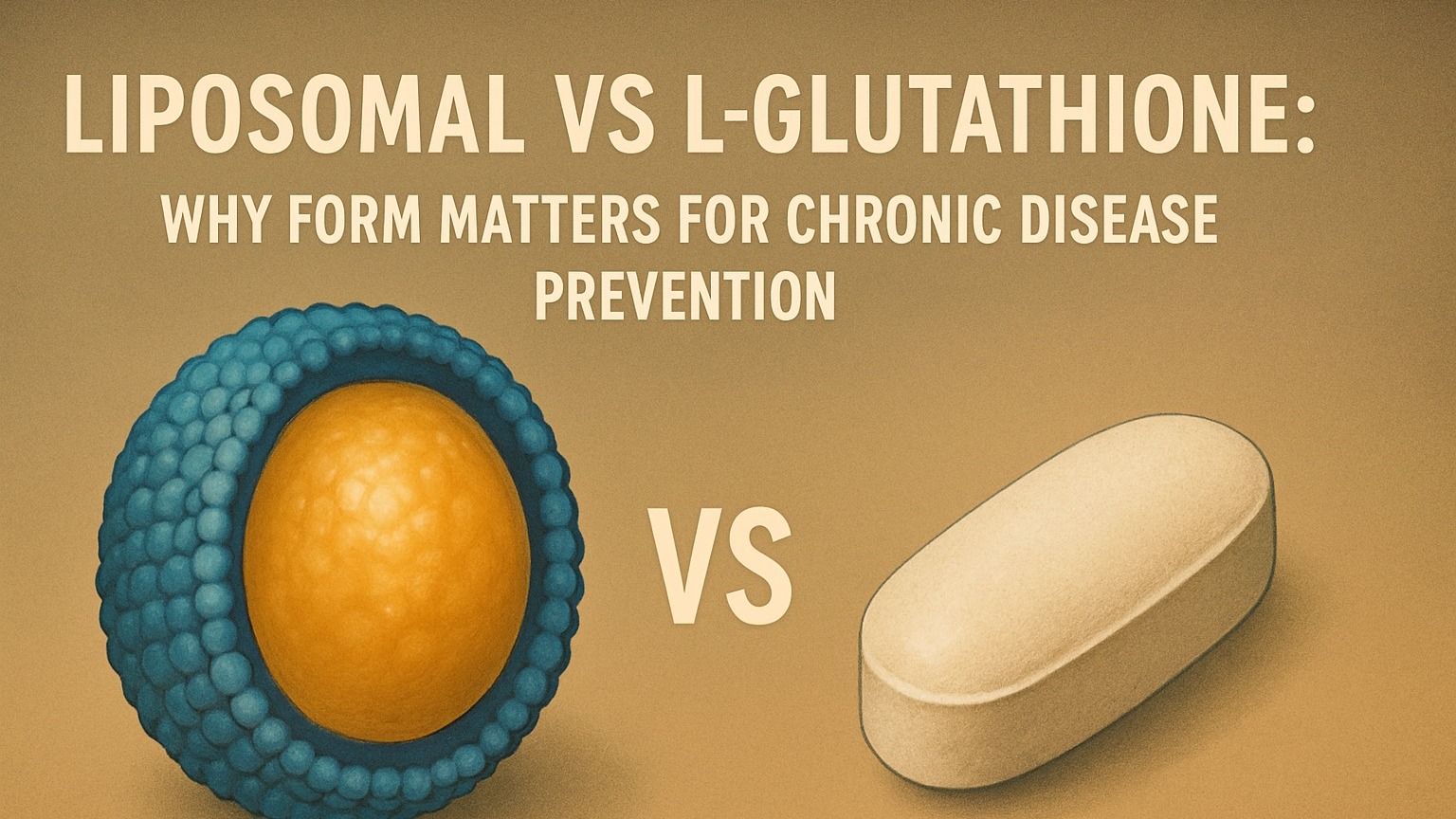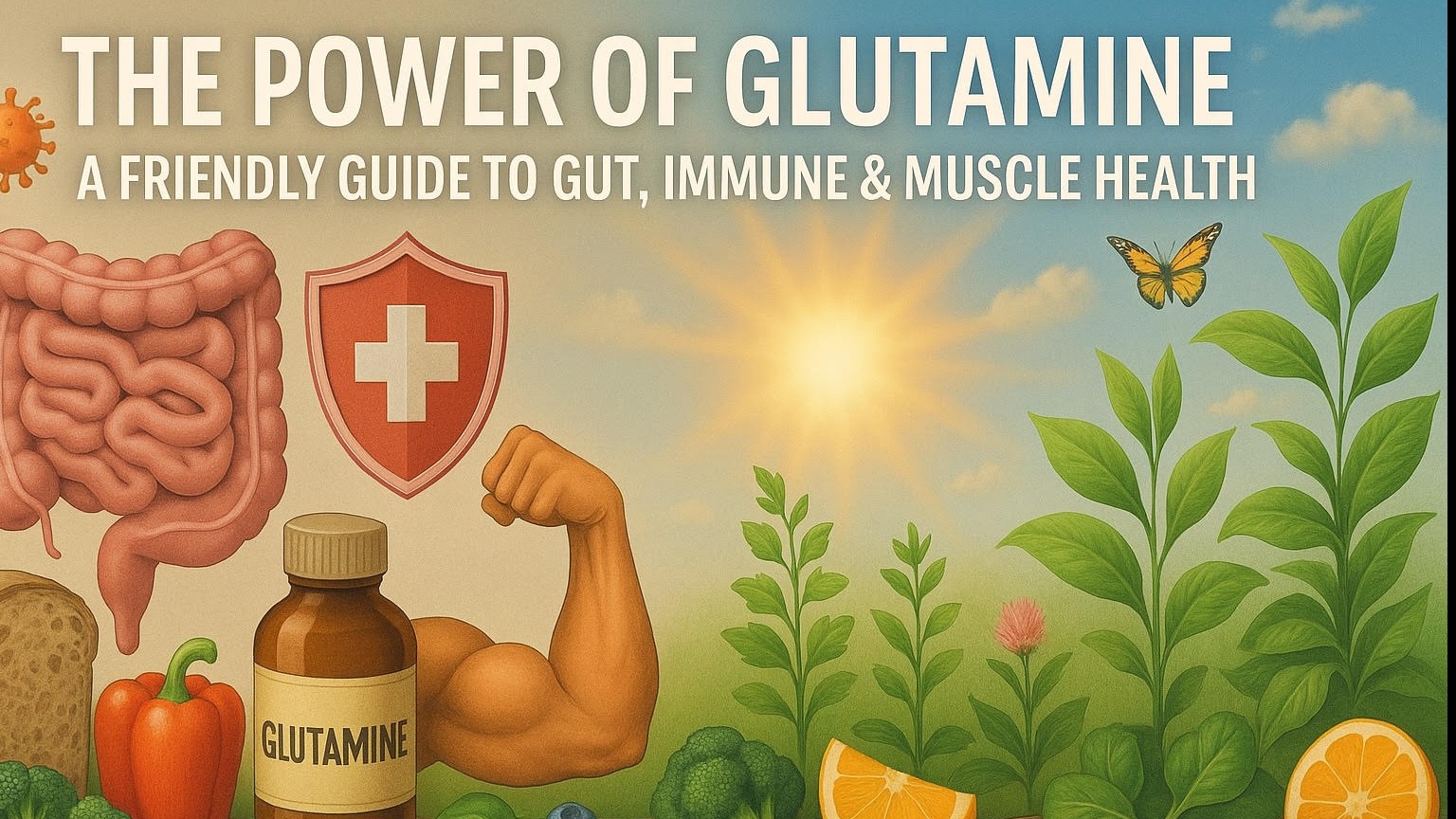
How the Master Antioxidant Glutathione Supports Detox, Immune Function & Longevity
If you're focused on detox, immune support, or preventing chronic disease, there’s one antioxidant you must know about: glutathione—often referred to as the master antioxidant for a reason.
But before you rush out and buy a glutathione supplement, here’s something critical: not all glutathione is created equal.
There’s a huge difference between L-glutathione and liposomal glutathione, especially when it comes to absorption, cellular impact, and long-term health benefits.
Let’s break down what makes liposomal glutathione benefits far superior—and how low glutathione levels could be affecting everything from your immune system to how fast you age.
What Is Glutathione and Why Does It Matter?
Glutathione (GSH) is a powerful antioxidant your body makes naturally. It plays a central role in detoxification, immune system support, mitochondrial energy production, and cellular repair.
Your liver, brain, and immune cells depend on glutathione for detox and disease defense. But chronic stress, toxins, poor diet, alcohol, medications, and aging all deplete glutathione stores over time.
That depletion contributes to a wide range of conditions, including:
Type 2 diabetes
Cardiovascular disease
Autoimmune disorders like lupus and rheumatoid arthritis
Neurodegenerative diseases like Parkinson’s and Alzheimer’s
Non-alcoholic fatty liver disease (NAFLD)
Chronic respiratory issues
And even age-related inflammation, also known as “inflammaging”
In short, glutathione for chronic disease isn’t optional—it’s essential.
Oxidative Stress, Glutathione, and Chronic Illness
When your glutathione levels are low, your body can’t neutralize reactive oxygen species (ROS) or repair oxidative damage. This leads to mitochondrial dysfunction, DNA and protein damage, and inflammation—the root of nearly all chronic diseases.
Research has linked oxidative stress and glutathione depletion to:
Insulin resistance
Accelerated brain aging
Increased risk of cardiovascular events
Cellular senescence (damaged cells that don’t die off)
Simply put, when your antioxidant defenses go down, inflammation goes up—and disease takes hold.
Liposomal Glutathione vs L-Glutathione: What’s the Difference?
You may have seen both L-glutathione and liposomal glutathione on supplement shelves. But here's the key difference:
❌ L-Glutathione (basic form):
Broken down by stomach acid
Poorly absorbed by the body
Low bioavailability = minimal impact
✅ Liposomal Glutathione (advanced form):
Encapsulated in protective lipid spheres (liposomes)
Absorbs through the gut lining directly into the bloodstream
Higher cellular uptake and effectiveness
Protects against degradation in the GI tract
Liposomal delivery = real results.
If you’ve taken glutathione in the past and didn’t feel anything, there’s a good chance it was L-glutathione—which your body never truly absorbed.
That’s why liposomal glutathione benefits go far beyond the standard form. Clinical studies confirm its superior bioavailability and impact on immune health, detox pathways, and inflammation control.
How Glutathione Supports the Immune System and Autoimmunity
Low glutathione doesn’t just make you tired and inflamed—it weakens your immune defenses.
Glutathione is deeply involved in regulating immune system activity. It helps:
Protect immune cells from oxidative damage
Maintain immune tolerance (important in autoimmune conditions)
Improve antioxidant capacity during infection or flare-ups
Limit inflammatory cytokines that trigger disease
For those struggling with autoimmune diseases, supporting glutathione is a game-changer. It can help modulate immune responses, reduce flare severity, and protect tissues from further damage.
How to Boost Glutathione Naturally
Supporting your body's glutathione levels doesn’t always mean you need a supplement—but if you’re already struggling with symptoms or chronic illness, a quality glutathione detox supplement is a smart move.
Here are smart ways to raise glutathione:
1. Use Liposomal Glutathione for High Absorption
This form bypasses digestive breakdown and delivers glutathione directly to your cells.
2. Take Glutathione Precursors
N-acetylcysteine (NAC)
Glycine
Alpha-lipoic acid
These help your body synthesize glutathione internally.
3. Eat Sulfur-Rich, Antioxidant Foods
Broccoli, garlic, onions, kale, arugula
Grass-fed meats, eggs, and organ meats
Cruciferous vegetables and fermented foods
4. Practice Lifestyle Habits That Raise GSH
Intermittent fasting
High-intensity interval training (HIIT)
Quality sleep and stress reduction
Avoid smoking, alcohol, and chemical-laden personal care
Together, these approaches form a natural glutathione support plan that builds resilience and helps fight chronic illness from the root.
The Bottom Line
Glutathione is one of the most powerful healing molecules your body makes—and liposomal glutathione is the most effective way to supplement it.
If you're dealing with inflammation, fatigue, blood sugar swings, brain fog, or autoimmunity, your glutathione levels may be depleted. The right form of glutathione could be the missing piece in your chronic disease recovery or longevity plan.
Don’t waste time or money on L-glutathione that your body can’t absorb. Instead, reach for liposomal glutathione and give your cells the antioxidant support they need to detox, repair, and thrive.
📚 References:
Richie, J. P., et al. (2015). Eur J Nutr, 54(2), 251–263.
Wu, G., et al. (2004). J Nutr, 134(3), 489–492.
Forman, H. J., & Zhang, H. (2021). Chem Biol Interact, 333, 109325.
Hageman, G. J., et al. (1999). Clin Chim Acta, 274(1), 1–26.
Sekhar, R. V., et al. (2011). Am J Clin Nutr, 94(3), 847–853.
Zarkovic, N., et al. (2001). Clin Chim Acta, 305(1-2), 1–7.
 Add Row
Add Row  Add
Add 










Write A Comment